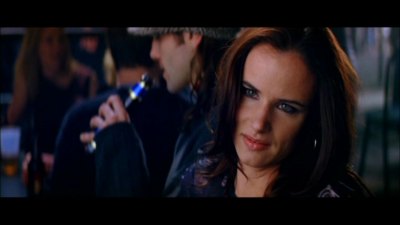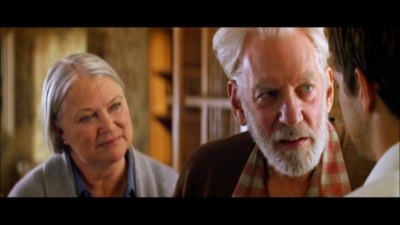| Reviews & Columns |
|
Reviews DVD TV on DVD Blu-ray 4K UHD International DVDs In Theaters Reviews by Studio Video Games Features Collector Series DVDs Easter Egg Database Interviews DVD Talk Radio Feature Articles Columns Anime Talk DVD Savant Horror DVDs The M.O.D. Squad Art House HD Talk Silent DVD
|
DVD Talk Forum |
|
|
| Resources |
|
DVD Price Search Customer Service #'s RCE Info Links |
|
Columns
|
|
|
Aurora Borealis
Oh, man; not another small, dear little movie about a disaffected, monosyllabic slacker and his eventual, inevitable redemption through the love of a free spirit. Haven't we all seen that movie entirely too many times? I mean, the very notion of "genre" is precious to me: the western, the spy film, the lone survivor of a nuclear holocaust film, the Satan's school for girls film. But spare me - at least for a little while -- this little sub-genre that insists on lionizing boring young men with self-limiting prospects because they're sad or whatever the hell else is wrong with them, while shamelessly romanticizing those cinematically "pretty" conditions like poverty and illness and parental abandonment. Well, at least Aurora Borealis, the 2006 feature film written by Brent Boyd and directed by James Burke, has a few good performances to get us over the lumpy, overly familiar story.

Duncan Shorter (Joshua Jackson) is a twenty-five-year-old drifting through life, going from one dead-end job to another (the film opens with him "comically" getting fired/quitting from a convenience store), unable to find a purpose in life because his drug-addicted father died when he was fifteen. His friends, if you can call them that (the entire movie they berate him, calling him names, and generally give him the big "F You"), are tired of his whining and reluctant to help him out by finding a job for him. His big achiever brother Jacob (Steven Pasquale), also calls him names, and uses Duncan's apartment, a la Billy Wilder (the filmmakers even have the nerve to mention that masterpiece in the dialogue), for assignations with his mistress. Even Duncan's old wreck of a car abandons him, dying on the frigid wintery streets of Minneapolis. Clearly, Duncan is falling behind in life, and he'll be damned if he's going to do anything about it.
A random, guilty visit to his grandparents, Ronald and Ruth Shorter (Donald Sutherland and Louise Fletcher), initiates a relationship with "life force" Kate (Juliette Lewis), a home visit caregiver who visits Ronald weekly. Ronald suffers from Parkinson's, kidney and heart ailments, and the oncoming effects of dementia. Something in Duncan's visit (his grandfather remembers when Duncan helped him at his hardware store) prompts him to take a menial job as a handyman's assistant at his grandparent's apartment building. Slowly, slowly, under the loving care of Kate's affection, along with the responsibility of watching over his grandparents and the other elderly residents of the building, Duncan learns to love again, to hope again, until a crisis in both his personal and professional life forces him into a life-changing decision.

Hey, I don't want to beat up on Aurora Borealis; it's not that important of a film to merit a slam. It's just that it's all so calculated and expected that its familiarity breeds contempt. It's a well-meaning film; there's no overt cruelty or malice (except for Duncan's excretory friends) in the characters' actions. And it has a feel-good ending that's hard to dislike. But that's precisely what I did, because it was as predictable and unoriginal as the rest of the film. In real life, most people get through the business of life fully aware that things aren't perfect, and a complainer like Duncan would be fast pushed aside by many who simply don't have the time or the patience to listen to that kind of whining. But in the slacker subgenre, his aimlessness and disaffection are heralded as somehow "truer" feelings than his supposedly shallow friends and family.
I also get tired of seeing these potentially interesting female characters, such as Lewis' Kate, getting shuffled off to the side, used only to illuminate the suffering of their boring, tortured boyfriends and husbands. Watching Juliette Lewis' alive, sexy, intelligent performance, I just wanted to know more about her, and her life and adventures as a city-skipping nurse. Now that would have been an interesting, fun film. But unfortunately, her character largely exists in Aurora Borealis to ask questions of Duncan, to care for Duncan, to bring Duncan out of his shell, and to spark Duncan to make some big decisions about his life. It's a waste of a good character and a marvelous actress.
The rather "pretty" depiction of life's miseries certainly doesn't lend much credibility to Aurora Borealis, either. I'm well aware that the vast majority of movies are inherently false and romanticized; I'm not looking for a documentary in Aurora Borealis. But wouldn't it be great to see one of these films show the real effects of losing job after job? I can tell you from personal experience (because the word "professional writer" is synonymous with "perpetually poor"), you don't get to keep quirky, well-appointed, high-ceiling apartments like Duncan enjoys. You don't have the money to go drinking with your friends, like Duncan does. And you don't have gas money to run your junker, like Duncan does. And once you get that "handyman's assistant" job like Duncan, you still don't have the money for those things - like Duncan does in Aurora Borealis. As well, the profound difficulties, as well as the overwhelming emotions that go along with caring for a relative suffering from severely debilitating diseases such as Sutherland mimics here, aren't so easily dealt with as they are here in Aurora Borealis. Particularly annoying is the pushing aside of the Ruth character, who merely serves as a hand wringer to Duncan and Ronald's sitcom-y bantering (Fletcher, a sensational actress, has really been poorly served in her post-Oscar career). Sutherland hams it up something fierce, with a few too many growls and eye rollings for my taste, but at least he has the star chops to pull it off as a successful exercise. In the end, Aurora Borealis is just too facile in its sufferings, its supposed emotional conflicts, and its tidy dramatic resolutions.

The DVD:
The Video:
The widescreen, enhanced for 16v9 TVs, 2.35:1 video image for Aurora Borealis is quite nice, with the frosty blues, grays, and blacks (which hold) nicely modulated. Skin tones are correct, with no transfer issues I could spot.
The Audio:
There's an option to listen to Aurora Borealis in Dolby Digital English 5.1 Surround stereo; I recommend that mix, because the soundtrack by Mychael Danna, featuring songs by Bob Dylan and Paul Westerberg, is terrific. There are no subtitles or close-captioning options.
The Extras:
There are quite a few extras for such a minor title. First, there's an informative, lively commentary by the director, James Burke, producers Scott Disharoon and Rick Bieber, and screenwriter Brent Boyd. Next, there are interviews with Lewis and Jackson (nine and a half minutes), the director and screenwriter (eleven and a half minutes), and the producers (ten and a half minutes). Behind-the-scenes glimpses during the production are featured in these interviews. There's also a "photo gallery" which are really just some video captures, and the original trailer (which makes the film seem like some hilarious romantic comedy).
Final Thoughts:
Depressingly familiar and rote, Aurora Borealis offers absolutely nothing new to the slacker subgenre, the sick grandparents subgenre, the warm, nurturing girlfriend subgenre, or to all the other films from which it borrows. Some of the performances are quite good, particularly Juliette Lewis in a welcome departure, essaying a mature, loving nurse, and I suppose its heart is in the right place. But seriously, you've seen it before too many times to recall. A rental might do if you're into any of the actors.
Paul Mavis is an internationally published film and television historian, a member of the Online Film Critics Society, and the author of The Espionage Filmography.


|
| Popular Reviews |
| Sponsored Links |
|
|
| Sponsored Links |
|
|
| Release List | Reviews | Shop | Newsletter | Forum | DVD Giveaways | Blu-Ray | Advertise |
|
Copyright 2024 DVDTalk.com All Rights Reserved. Legal Info, Privacy Policy, Terms of Use,
Manage Preferences,
Your Privacy Choices | |||||||














